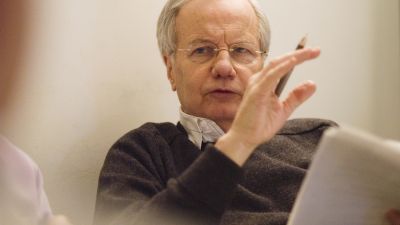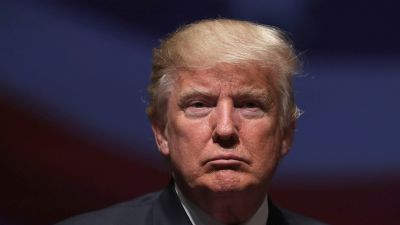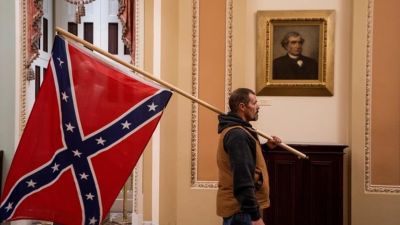
For most of Donald Trump’s presidency, it seems that the news has come at us like a firehose, spraying information, disinformation and quotable tweets. And that was before the pandemic. Now with more than 100,000 dead, presidential spectacles and unemployment at Depression-era highs, there’s even more news flying under the radar. The team at BillMoyers.com brings you the news you need to know — some of it good, some of it outrageous, all of it important — that’s been covered up by COVID-19.
1,014
More than one thousand people have been fatally shot by the police in the last year. The exact number is 1,014 and comes from a database The Washington Post started in 2015 to track every lethal police shooting in the country. It now contains 5,000 names. “Despite the unpredictable events that lead to fatal shootings, police nationwide have shot and killed almost the same number of people annually….Although half of the people shot and killed by police are white, black Americans are shot at a disproportionate rate. They account for less than 13 percent of the U.S. population, but are killed by police at more than twice the rate of white Americans. Hispanic Americans are also killed by police at a disproportionate rate.”
A ‘New Cold War’
The United States is pushing China to the brink of a “new Cold War” says China’s foreign minister. “This dangerous attempt to turn back the wheel of history will undo the fruits of decades long China-U.S. cooperation, dampen Americans’ own development prospects, and put world stability and prosperity in jeopardy,” Foreign Minister Wang Yi said Sunday in a video news conference on the sidelines of the annual session of China’s National People’s Congress.
Meanwhile, Secretary of State Mike Pompeo certified to Congress that Hong Kong is no longer autonomous from mainland China. According to CNN, “President Donald Trump and Congress will decide what actions to take as a result of the certification…Ending a special trading relationship that has existed for decades would carry costs for American business, rattle an already fragile global economy and hurt Hong Kong more than China, experts warn.”
Pompeo’s decision comes as “China’s legislature has approved a controversial national security law for Hong Kong, dealing what critics have said is a ‘killer blow’ to the city’s autonomy and freedoms,” per The Guardian. The new law has led to widespread protests throughout the city and the arrest of hundreds of protestors, many in their teens or early twenties.
On May 27, the House voted overwhelmingly “to pass a measure that would punish top Chinese officials for detaining more than one million Muslims in internment camps, sending President Trump a bill intended to force him to take a more aggressive stand on human rights abuses in China,” per the New York Times.
Educational Inequality
With states and local governments reeling from a downturn in tax revenue, experts worry that school districts across the country are about to face severe funding shortages. NPR reports: “With the nation’s attention still fixed on the COVID-19 health crisis, school leaders are warning of a financial meltdown that could devastate many districts and set back an entire generation of students. ‘I think we’re about to see a school funding crisis unlike anything we have ever seen in modern history,’ warns Rebecca Sibilia, the CEO of EdBuild, a school finance advocacy organization. ‘We are looking at devastation that we could not have imagined … a year ago.’”
And the pain, the report says, will not be felt equally. “In many states, these cuts will hit vulnerable, low-income communities the hardest. That’s because of how America funds education. On average, the bulk of a school’s resources comes from a roughly even split between state and local funding, the latter largely from local property taxes. But differences in property wealth between districts have created decades-old disparities that many states have tried to alleviate with additional state money. As a result, ‘when state funding starts to drop,’ says Michael Griffith at the Learning Policy Institute, ‘what we see is a separation between the haves and have-nots.’”
Education inequality is nothing new in the United States. Take for example Natalie, a straight-A student profiled recently in the New York Daily News. Since schools in NYC were forced to close, Natalie has never missed an assignment thanks to a Chromebook laptop and 60 days of free Internet provided by the cable company. However, that free trial runs out before the AP tests, so one of Natalie’s teachers is trying to help. “A few days ago, I called the College Board, which administers AP exams, desperate to find a solution. Their suggestion: She should try to take the test sitting outside a McDonald’s. I got off the phone in disbelief as I rehearsed what I was going to say to her: ‘Sorry, Nat. I tried, but College Board says your best bet is to bum the free wifi off the McDonald’s on Knickerbocker.’” Her teacher is determined that won’t be the case: “you better believe she won’t be at a McDonald’s on test day. Instead, I’ll be standing outside her house, cheering her on underneath my face mask with my phone’s hot spot connected to her laptop.”
Navajo Nation
A former White House official was given a $3 million contract to supply respirator masks to Navajo Hospitals. A ProPublica investigation reveals that “Zach Fuentes, President Donald Trump’s former deputy chief of staff, secured the deal with the Indian Health Service with limited competitive bidding and no prior federal contracting experience. The IHS told ProPublica it has found that 247,000 of the masks delivered by Fuentes’ company — at a cost of roughly $800,000 — may be unsuitable for medical use. An additional 130,400, worth about $422,000, are not the type specified in the procurement data, the agency said.” Meanwhile the Navajo Nation has the highest infection rate of coronavirus per capita of anywhere in the US.
Expand The Vote
U.S. District Court Judge Robert Hinkle ruled that people with felony convictions can vote in upcoming Florida elections even if they have outstanding fines or fees. The Orlando Sentinel says, “Hinkle ruled that a law passed by the Legislature and signed by DeSantis was unconstitutional because ‘the State of Florida has adopted a system under which nearly a million otherwise-eligible citizens can vote only if they pay an amount of money. … Many do not know, and some may not be able to find out, how much they must pay.’ The judge called the law a ‘pay-to-vote system.’”
Slate outlines why Judge Hinkle’s ruling is so monumental. The law gave “people with felony convictions two choices. They can register to vote and hope that state prosecutors do not later dig up court debts and bring criminal charges against them. Or, to avoid risking jail time, they can surrender their constitutional right to vote. On Sunday, in a 125-page decision, Hinkle ruled this predicament unconstitutional. In doing so, he meticulously detailed the extraordinary negligence and incompetence exhibited by Florida lawmakers as they rushed to stop ex-felons from voting. That record will make it very difficult for an appeals court—even one stacked with Trump judges—to reverse his decision. It will be impossible for any judge to overturn Hinkle’s ruling without carrying water for the GOP.”
Going Nuclear
The Trump Administration is discussing whether to conduct the first U.S. nuclear test since 1992. The Washington Post reports: “The matter came up at a meeting of senior officials representing the top national security agencies May 15, following accusations from administration officials that Russia and China are conducting low-yield nuclear tests — an assertion that has not been substantiated by publicly available evidence and that both countries have denied….The meeting did not conclude with any agreement to conduct a test, but a senior administration official said the proposal is ‘very much an ongoing conversation.’”
Another Epidemic
A third of Americans are exhibiting signs of clinical depression or anxiety, according to new Census Bureau data. The Washington Post reports: “The troubling statistics were released last week in a tranche of data from the Census Bureau. The agency launched an emergency weekly survey of U.S. households at the end of April to measure the pandemic’s effects on employment, housing, finances, education and health. In the most recent data release, 1 million households were contacted between May 7 and 12, and more than 42,000 responded. Buried within that 20-minute survey, U.S. officials included four questions taken nearly word-for-word from a form used by doctors to screen patients for depression and anxiety. Those answers provide a real-time window into the country’s collective mental health after three months of fear, isolation, soaring unemployment and continuing uncertainty.”
Social Dystopia
American’s use of social media is at an all-time high and that could lead to a blow against democracy, according to an NPR analysis. “For the first time ever, Facebook’s Mark Zuckerberg announced, more than 3 billion people used Facebook, Messenger, Instagram or WhatsApp in a single month. Twitter announced last month as well that it saw a first-quarter 24% year-over-year increase in the number of daily users who saw ads. The increased usage spans the globe, says Pinar Yildirim, a marketing professor at the Wharton School of the University of Pennsylvania who specializes in social media trends….One way that increased usage may be felt in the 2020 election isn’t in just the amount of false information being seen and shared, Yildirim says — but in how polarized the American public is during the campaign cycle.…‘To put it simply, in this space Russia wants to watch us tear ourselves apart,’ said David Porter, an assistant section chief with the FBI’s Foreign Influence Task Force, earlier this year. More people spending more time on the platforms where this takes place likely will mean even more attempts at amplifying divisions and stoking discord.”
Meanwhile a Wall Street Journal investigation shows that for Facebook executives, that divisiveness was a feature, not a bug. “The social-media giant internally studied how it polarizes users, then largely shelved the research….Facebook policy chief Joel Kaplan, who played a central role in vetting proposed changes, argued at the time that efforts to make conversations on the platform more civil were ‘paternalistic,’ said people familiar with his comments….Facebook revealed few details about the effort and has divulged little about what became of it. In 2020, the questions the effort sought to address are even more acute, as a charged presidential election looms and Facebook has been a conduit for conspiracy theories and partisan sparring about the coronavirus pandemic. In essence, Facebook is under fire for making the world more divided. Many of its own experts appeared to agree—and to believe Facebook could mitigate many of the problems. The company chose not to.”
Local News
An Amazon-scripted news segment ran 13 times across at least 10 local news channels this week. According to the progressive news outlet Courier, “The package…was produced by Amazon spokesperson Todd Walker. Only one station, Toledo ABC affiliate WTVG, acknowledged that Walker was an Amazon employee, not a news reporter, and noted that Amazon had supplied the video.”
‘Amazingly Cruel’
The National Park Service is reversing Obama-era regulations and will allow hunters in Alaska to shoot bears and wolves, along with their young, while they are in their dens. Jesse Prentice-Dunn, policy director for the Center for Western Priorities, tells The Guardian that the change is “amazingly cruel” and “just the latest in a string of efforts to reduce protections for America’s wildlife at the behest of oil companies and trophy hunters.”



